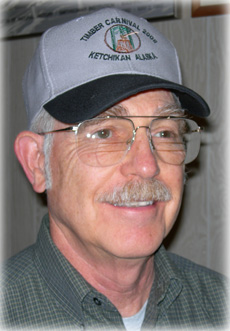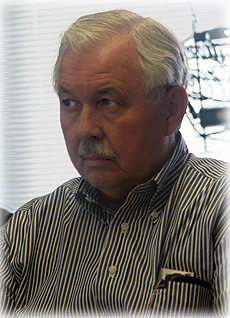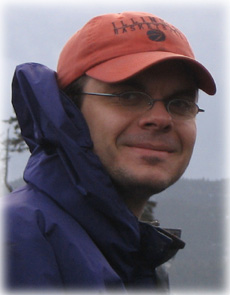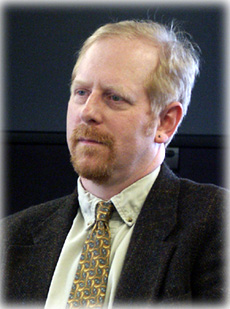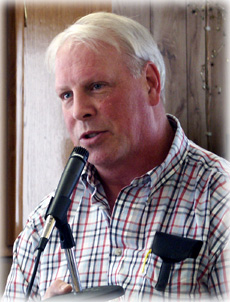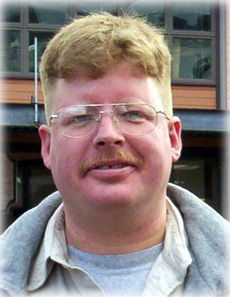 By M. C. Kauffman September 25, 2006
The six candidates, who each would like to be officially seated on the assembly by the voters, had an opportunity on Wednesday, September 13th, to state their positions on local issues by responding to questions during an assembly luncheon forum held by the Greater Ketchikan Chamber of Commerce.
The six borough assembly candidates are George Tipton, Richard "Dick" Coose, Robert "Gus" Gustafson, Gregory Vickrey, Mike Salazar and Dave Kiffer. There were no time limits enforced on the candidates' opening statements or their responses to the five questions. The questions were generated by audience members and presented to the candidates by Blaine Ashcraft, Chamber of Commerce Manager. The almost hour-long forum began with opening statements in which candidates spoke about their backgrounds and political positions. Candidates were then given the opportunity to respond to five questions that addressed issues such as consolidation, timber harvesting, roads, economic development, electrical power needs, as well as airport ferry costs. One candidate, Robert "Gus" Gustafson, arrived approximately thirty minutes into the forum and missed his round to respond on several questions. Opening Statements Richard "Dick" Coose has lived in Ketchikan for approximately twenty-six years and has previously served as an Assembly member. His position for running for Borough Assembly is four-fold: accountability, economic development, infrastructure and civic participation. About accountability Coose said, "The Borough Assembly has to establish goals and objectives and they have to be accountable for them and follow up on performance standards and so forth." On economic development, Coose said, "We need a business friendly borough." He explained, "That means taxes and borough planning and zoning requirements and doing it the right way so we can get businesses in here that come up with year-round jobs." The bridge to Gravina will boost economic development leading to the development of Gravina said Coose. "We just have to keep moving forward with that vision and never give up no matter who's jabbing us because we're the bridge to nowhere." In his opening statement, Coose also said the borough needs to work with the city and state to provide infrastructure and to work to keep the Marine Highway headquarters in Ketchikan. Addressing civic participation, Coose said, "We've got to get more people to the podium to talk to us [assembly members] about what's going on in the community and we've got to keep them [citizens] informed." Currently one can watch television or get a little bit out of the newspapers but there's a better way to keep people informed and it needs to be done said Coose. Mike Salazar who has lived in Ketchikan nearly sixty years, made a short statement mentioning that he previously served on the assembly and the city council and the city council and borough assembly when it was one unit. He provided his background on paper to the audience. According to Salazar's background, he is a Vietnam veteran and earned an honorable discharge as Captain in 1969. He earned many decorations including the Distinguished Flying Cross, Bronze Star and Purple Heart. (Background) Gregory Vickrey began his opening statement saying, "I'm running primarily because I believe we need a pro-active borough and a pro-active assembly and in order to get that we need to follow through with several steps when it comes to economic development, when it comes to education and other priorities that this community sets." Vickrey said, "First and foremost, we need to be willing to listen to all members of this community." He said being pro-active listeners as assembly persons would be a huge step towards approaching economic development and towards approaching educational advancement for this community in a timely fashion. Vickrey said, "It takes a unified effort to do that, and it takes civic participation as Mr. Coose was saying." Dave Kiffer who is currently serving on the Borough Assembly spoke next. Kiffer who was born and raised in Ketchikan has served on the assembly for three years. Kiffer began by asking what can we do to make things better, what can we do to actually improve the community and leave a better community?" Movement in a community can't be blocked Kiffer said. Kiffer said, "The borough has a great many issues facing it." He said probably the biggest issue facing the borough when he first got on the assembly was that the borough's financial house was not in order. Kiffer said most folks probably remember the worst budget year when the assembly raised sale taxes, raised property taxes and cut the budget. Kiffer said things are now better in the borough and "I'd like to continue to be part of the solution." George Tipton, who's lived in Ketchikan for many years, grew up in Juneau and graduated from high school in Juneau. Tipton said his father was the head of Federal Highway Administration and that he goes back with transportation projects since childhood and had the opportunity to follow the Marine Highway Systems' formation and other projects. The last three projects Tipton's father worked on were the Juneau four-lane, the Sitka bridge and the Ketchikan airport - one of the reasons for building the Ketchikan bridge said Tipton. He said he knows a little history because his father actually had designed a bridge to go with the Ketchikan airport that never came to fruition. "It [the bridge] was suppose to happen five years after the airport was built," said Tipton. Tipton said he moved from Juneau to Fairbanks and worked in construction for many years and moved to Ketchikan in 1989 to run the White Pass marine terminal. He has been in private business since 1998 and is retired out of the Operating Engineers Local 302 State of Alaska. He is president of the local Ketchikan CHARR and sits on the statewide CHARR board as well as being the past president and chairman of the board. Tipton said he formed the Ketchikan Softball Association shortly after moving to Ketchikan and just recently resigned after being president since its inception. "I was involved heavily in a lot of different capital projects in this community," said Tipton, "from the Weiss ball fields and all their improvements to Dudley field, to the recreation center, to taking the initiative of the three elementary schools that ultimately were put on the 1997 bond proposition that are now finally completed with Fawn Mountain being done." He added, "Not quite the order we had originally projected, but ultimately they were done." Tipton said, "I've been a fiscally responsible person. Mr. Kiffer talked about having to go through the pain of the two tax increases. That was the reason that I ran before and got on board." Tipton sat on the assembly from 1995 to 1998 and 2002 to 2005. He said, "I probably sat on every committee imaginable for the community and people that know me know that I'm involved, prepared for a meeting and the issues at any time. Question 1: Where do you stand on consolidation? Do you support a separate KPU board with consolidation? What about consolidation and the new passenger tax? "I've always said that I've supported consolidation in the past," said Tipton. "We have some new things that are coming into play with it - this passenger tax just occurred and it's a major implication because it has a revenue stream attached with it now well in excess of 2 million dollars." Tipton said there have to be some costs associated with consolidation. "I think in the long term, the costs that you have initially are outweighed by the gains that you get from streamlining the government, making it efficient, and you have one voice no matter where you're talking throughout the state, in the legislature and Congress," he said. Regarding if he supports a separate KPU board, Tipton said, "General government and the utility board are two distinct, separate functions." For the government to have its own board with its own decision making power makes no sense whatsoever said Tipton. Dave Kiffer spoke to the questions next. As a city resident he had considered voting in favor of consolidation three times in belief that consolidation would create efficiencies. "Whether it will save money in the long run that's always kind of up in the air," Kiffer said. Regarding new information for proposition 2 Kiffer said, "The assembly had a brief report from our attorney at the last meeting indicating there might be a financial 'no' to consolidation that we'd have to consider." Kiffer continued, "At this point, I need to hear more information on that before I'll make that a reason not to vote for consolidation." "Of greater concern to me," said Kiffer, "in this particular plan is how the Gateway Service area works." He said he needs to do a lot more research in the specifics as he's heard a lot of different things and will be studying the work the Ketchikan Charter Commission has done over the past couple of years. Kiffer said, "It is Ketchikan's future and we need to make sure that this plan is the right plan." Regarding a separate KPU board, Kiffer said of an earlier KPU board, "I remember the KPU board being more advisory to the City Council and frequently there were times when they would come up with ideas and the Council would overrule." If consolidation is approved Kiffer said, "I think in this particular case if you've got an overall body that's responsible for city and borough functions now, I think trying to keep KPU on top of that makes it that much more impossible" - indicating he would support a separate board. Gregory Vickrey addressed the questions next. He said he had looked at the plan over the past several months and has looked at previous attempts at consolidation in order to determine where he stands as a voter. Vickrey said, "I also went through the pains of attending a couple of meetings and listening to both sides of the issue." "I'm for consolidation in theory; however, I think the current arrangement, the current charter doesn't interest needs explicitly enough for the long-term future of this community," said Vickrey. "I'll be voting no on consolidation." Further complicating the consolidation issue said Vickrey is the recent passage of the passenger tax. He said, "I would like further analysis of that and as an assembly member would vote for that analysis before moving forward with any further consolidation effort." Vickrey said he believes that an additional KPU board would be essential. Regarding consolidation Mike Salazar said, "I really believe that the taxpayer is going to make the decision." He said, "The $2.7 million that the borough will not get if it's consolidated really set an alarm off for me because if you're talking about a two million dollar increase with consolidation, then you lose two million in the tax from the proposition, you're talking about a four million dollar cost to the borough which is about four mils - it's not two [mils]." "If this stands the ways it is," said Salazar, "I wouldn't support it [consolidation] based on that." He added that he would also need to look into the passenger tax effects on consolidation as the fiscal notice was just recently released by the Borough Attorney within a couple days of the Chamber's forum. Regarding a separate KPU board, "I would support the KPU board," said Salazar who was on the board years ago. "I think it provides a function; it gives more public input into the whole process." Dick Coose addressing the three-fold question said, "If we consolidate, then I believe that there should be a separate KPU board and it should have some authority and it should be probably pretty much taken away from the assembly. That way we'll get more of a private-type aspect to it." Regarding the passenger tax or head tax and who gets the money, Coose said, "It needs to be given serious consideration because that's 2 mils plus, and that's a lot of money out of the health and property tax folks." He continued, "But it's also money that's restricted in what you can do with it. That needs to be a consideration also." Coose said he voted once for consolidation and he voted once against it. "I'm not going to tell you how I'm going to vote this time," said Coose. The voters will make the decision on consolidation and Coose said voters should make sure they know what the charter means before they vote. He said, "I encourage everyone to know what that charter means because I'm not too sure it's the best one for this community." Robert "Gus" Gustafson, a late arrival to the forum, was given an opportunity to comment on consolidation. "As far as consolidation goes, there really are a lot of good points and a lot of bad points," said Gustafson. He said basically what he's heard from the community is that consolidation isn't wanted. He remarked that there are a lot of mixed feelings regarding consolidation in the community. He said, "Basically what I've gotten from the community is that they don't want it [consolidation]." Question 2: How much commercial timber harvesting do you support in southeast Alaska? Do you support the building of roads for recreational use from Revilla to Shelter Cove and access to Bostwick and central Gravina? "There's lot of timber out there," said Dick Coose, "and we're not getting much of it. The borough has to be very proactive in getting that timber harvested. We need between 360 million and 400 million [board] feet coming off this forest." Coose said, "It's fully sustainable and it can be done. We have to push for it. The borough government can become a partner with the government. We can help it happen, but we've got to do it and we've got to be proactive." Regarding timber Coose said, "We're natural resource based and that's part of our natural resources." Since the early 80's the Bradfield Transportation Corridor has been considered for connecting the communities of Wrangell and Ketchikan with the mainland road system in Canada. Coose said hooking the Shelter Cove road into Bradfield has been talked about for a long time. "It's our way off this island. I absolutely support it," said Coose. "It's recreational oriented, it's get off the island oriented and it is tourism oriented." Mike Salazar said he agreed with Coose. "We've got this three-legged stool and timber was one of the legs and we pulled it out from under the economic base of Ketchikan." "In order to have real jobs that pay a decent living," said Salazar, " I think we need the timber industry and if it takes 300 or 380 million [board feet] to support the veneer mill, and Sealy's mill and Wrangell, then I think that's what we ought to be shooting for." Vickrey spoke next. "I'm lucky enough to work for the Tongass Conservation Society so I'm involved in these issues every day in one way or another." What's sustainable in terms of a timber harvest is not clearly defined yet said Vickrey. He told the Chamber audience that there's a significant amount of science that says that some level of commercial harvesting is doable. Vickrey said the other big question in determining how much of the markets are available to us is... "Is there an integrated value-added local market available for development? Currently there's not." "There need to be significant measures that take place in order to develop a value-added market here locally where we can use Tongass timber on the Tongass," said Vickrey. "The borough needs to have its hands in that sort of development because it is an economic opportunity for Ketchikan and other communities that have been dependent upon the commodities market in the role of timber acts." Vickrey said, "I surely support approaching sustainability when it comes to timber management." He said it is incredibility important that all involved stay involved and become proactive in terms of answering the sustainability question. Vickrey said when he communicates as the director of the Tongass Conservation Society with other entities that are involved in redoing the Tongass Land Management Plan, it's very important that all be incredibility forthright in the information put out on the table to determine where common ground is and what can be done. "There are a number of processes in place with regards to the Tongass Land Management Plan that we're all pursuing in good faith. I feel confident that many good measures will come out of that," said Vickrey. "I would like to see a borough government that is more involved in the process and becomes a daily stakeholder in approaching sustainability for the timber management of the Tongass." Regarding roads, "Generally speaking," said Vickrey, "I do support roads for recreational purposes. I think there's an inherent value to our quality of life tied into those types of projects." Vickrey said, "I do, however, in the course of my job look at those on a case by case basis and will continue to do so. Each of those will fall under the scrutiny of the Tongass Conservation Society but as a borough assembly member I'll continue to do the same." "Generally speaking though, I do support roads for recreational purposes," said Vickrey. Regarding the Gravina road, Vickrey said there are a lot of questions about the road. He said he had discussed the road with borough staff and "there are a lot of questions about how the road is being built, not so much why the road is being built - but how it's being built." Vickrey said, "I'll continue to raise those questions as an assembly member." Referring to the Governor's Roads to Resources Program, Vickrey said, "There is always an economic basis for building those roads. We have to make sure that roads like that serve the community's needs on a broader scale. And if they do that, if they meet that qualification, I see no problem with developing roads where they make the most sense for the community." Vickrey said, "It's the borough's job to be on top of every project that goes on within our neck of the woods. And if that's not happening, it needs to." Kiffer said, "Having lived here most of my life, I'm in favor of any road that goes anywhere." Over the past years Kiffer said he has worked on the assembly discussing & figuring out ways to hook up with the Shelter Cove road system out of Herring Cove. "I will certainly continue to work on that and any other road project that goes out at this point," said Kiffer. Kiffer said, "As you all know, no matter what we do, the decisions are somewhat being made on a level above us." The fact that there are no roads coming to or from Ketchikan is not a decision made by this community said Kiffer. "We can certainly, as a community, come together and decide what the level should be and impress that with national officials and also vigorously fight attempts to prevent all timber harvesting in the Tongass," said Kiffer. "People tend to forget just how big the Tongass National Forest is. You can have a timber industry there, you can have a mining industry there, you can also have tourism and a great variety of other things. It's a huge area." Kiffer continued, "This is something that we can do and certainly the borough assembly needs a very active role in working with all the other stakeholders in this process to make sure the community's needs are met in this process." Tipton, speaking next, addressed the roads issue first and said he personally supports both roads. "You do look at them at a case by case basis," said Tipton. People will tell us what they want and the assembly is elected to represent what the people say they want said Tipton. Tipton said the Shelter Cove road has been talked about for years as a starter road link for getting off the island. Regarding timber harvesting, when you're looking at timber sales, the mills have said the amount of timber they need for optimum value to be able to produce and to keep those big paying jobs that are in our neck of the woods said Tipton. "We've all heard these issues before," said Tipton. "You can talk about a value added product all you want but you can't have a product unless you have the timber. It is the inherent job of the assembly, as well as every citizen, to try to bring forward to the Forest Service and in any other meeting that they have, why it's important to have this segment of an industry." Tipton said, "All of us that live here hunt, fish and recreate in that same area. We're the best stewards of our own environment." He said, "People say you can't do that hand-in-hand, it's been proven for a hundred years in this neck of the woods that you can do it." Question 3: Have you lived in other communities that you have been politically involved in or active in and for how long in each of those communities? Coose said he had not been involved politically in other communities. He said when he worked for the Forest Service, the employees stayed out of politics. "When I retired, I got involved in the local community and have given back what was given to me." Salazar, who's lived in Ketchikan for 60 years, said he's been in business in Ketchikan for over thirty years. Salazar has served on the local City Council and Borough Assembly off and on since 1976. Vickrey said he is originally from Illinois and this is his second "stint" in Alaska. "I was active politically in economic and business development in the Bristol Bay region for a couple of years." After that Vickrey said he spent some time in Charlotte, North Carolina, and worked on a number of local issues. Vickrey said, "I also fell into a national campaign as well and spent a year during 2004 working on a national political campaign." Vickrey said since high school he has been involved with local issues. He was an active volunteer in the campaign of one of his high school teachers who ran for a house seat in Tennessee. "Over the years, I've always had the energy and the will to be involved in local politics," said Vickrey. Kiffer said he's lived in a variety of other places and as most Ketchikan kids, leave and come back. "I've not been politically active in the communities," said Kiffer, "but I did spend a great deal of time covering the meetings primarily because I was a reporter in places like Boston, Wyoming, Los Angeles and elsewhere." Kiffer said, "It's safe to say I've probably spent more time in governmental meetings than just about anyone else that I know of." Kiffer said his first political campaign was at ten-years old waving campaign signs for Bill Hamilton who was running for Ketchikan mayor. Tipton said he had been active politically in other communities. He was active in Fairbanks with former Representative and Senator Steve Frank, and Representative Bob Bosworth. "Going back to Juneau where I grew up it's pretty hard not to be involved when your father is the head of Federal Highway Administration and you have functions of the house that involve the governor, the rear admiral, all the commissioners, key legislators at different times from the time you're a young kid on," said Tipton. Tipton said he'd also been involved in politics since he was a little kid. "Working with the state library, where before there really was a spot to store all the records for the legislature, they'd be waiting for George to get out of school to have copies of this key legislation that you had filed somewhere and nobody else knew where it was." He continued, "It was kind of a nice feeling to have the Senator himself - and not the aide - come down and want you to get the documents for him." Robert "Gus" Gustafson addressed the question briefly stating that he has lived in Alaska since 1994. Gustafson said he also has been involved in politics since he was a little kid noting his relatives were involved in local politics in the state of Maine. On a local level, Gustafson said he has served as the legislative liaison for the City of Saxman. Question 4: What do you view as the most important economic development project for Ketchikan at present? Coose said, "Presently what's hot and heavy and doing something for us is the development of our docks for tourism. That we know is going to happen, that we know is going to put jobs in town." Coose said efforts should continue to try to get the Gravina bridge access, help the Ward Cove area develop and support the shipyard. Regarding economic development, Salazar said it is important to make sure the veneer mill gets enough timber to operate and that the shipyard and docks projects are supported. In addition, Salazar said there are a number of projects out there, including the bridge project, that would revitalize Ketchikan's economy. Vickrey said there are three elements of economic development that are critical. First, the creation of a business development center. "The benefits are just incredible under the right leadership," said Vickrey. Creating a business development center would be one of the first things he would want to promote as an assembly member. This would provide an opportunity to utilize the creativity in the community to create new enterprises, both commercial and industrial said Vickrey. The second element, said Vickrey, is answering and addressing the question of power. "While talk has heated up over the intertie primarily due to the fact that it is a gubernatorial election cycle, I would like to see something more substantial come to pass with both the intertie and exploration of our other options. That includes Lake Mahoney and that also includes going back to the papers from the 1970's that say we have expansion opportunities at both Ketchikan Lake and Beaver Falls." Lastly, Vickrey said in the state transportation plan for last year there were monies allocated for the southern gateway shuttle which would provide Ketchikan with a consistent link to Prince Rupert. "That money has fallen by the wayside," said Vickrey. "I think we need to do everything in our power to convince the legislature to put that money back in because Prince Rupert is going to be booming in the next few years and we need to be able to take full advantage of that based on our proximity and the ability the Alaska Marine Highway System provide. Not only expand passenger service, but more importantly cargo service to the Prince Rupert area." He concluded his response to the question by saying, "Eventually that port will be one of the largest in the world." Kiffer said Ketchikan needs to start weaning from the idea that the state or governor are going to keep trying really large construction projects to keep our economy going. "As we all know, those are short-term fixes - whether it's the bridge or anything else, these are short-term economic boosts." Kiffer said an example of where federal money was focused for a long-term economic boost is the Ketchikan shipyard. More developed needs to be encouraged at Ward Cove. Kiffer said, "Finally we're starting to gradually, over the last couple of years, get that back on the tax rolls and get things happening in that area." Regarding power expansion, Kiffer said, "Without power, we can't do a whole lot." Kiffer said the borough has taken a sit-back roll over the last few years and has not made it a borough priority - it's been a city priority. "Well frankly we can't open the veneer mill plant, or we can't add a new major employer business account because we haven't got enough power - and it's all our responsibilities," said Kiffer. While there are other expansion options such as at Ketchikan Lakes and Mahoney Lakes, right now we've got an intertie that's half built said Kiffer. With $50 million dollars already invested, Kiffer said, "we need this community to push the intertie." Tipton said the docks and shipyard have to be the number one priority. "You have a large amount of money that's going to the docks publicly, and then you also have a private venture that's putting in an equal amount of money for another dock. The shipyard has in excess of over 50 million dollars for development over the next five to six years getting it close to completion." Tipton said the revenue dollars brought to the community because of the dock and shipyard will be unsurpassed. Of the revenue coffers from taxes and docking fees Tipton said, "There is nothing that can touch it." He said, "You can talk about the veneer mill and everything all you want; while we want to have, it's on a lowering scale as compared with those two." Regarding power, Tipton said, "The intertie has been a project for a long time. While I've always supported it, it's kind of at the roadblock and they're having to study how you tie into B.C. power." Tipton said in 1995 studies were done by KPU on other hydroelectric projects. He said one that the borough could be involved with is at the old mill dam which would create 4 mega-watts and one at Whitman. "Those two [projects] of the four that were looked at are feasible," said Tipton. "Maybe it's time to go back and look at those rather than sit and play the waiting game to get the large amount of money to complete the intertie." He said, "That can still tie into the intertie at a later date even if you're completing it cause the whole plan is to try and tie into a grid throughout southeast and basically hydro." Tipton concluded by stating, "We can't develop without power." Regarding the intertie Gustafson said, the power problem needs to be solved in order for this community to grow. Gustafson said he couldn't add to what the other candidates had already said about the shipyard. "The veneer plan, on the other hand, that's a solid project if they had the 50 million board feet a year they need to run that - not to mention all the local businesses a local operation like that would support." "The shipyard, the intertie, the veneer plant are three creative projects that are going to be taken care of," said Gustafson. "The bridge is a good idea," said Gustafson. That will definitely open up property for businesses on Gravina he said. Question 5: Should the airport ferry be free to residents? Free to everyone? Should the cost be included in the landing fees? Coose said, "Absolutely, if you want to raise the taxes or get the money from somebody else to pay to run it." Adding it to the landing fees, that's just putting the cost back on to a private carrier that will raise their fees for flying out said Coose. Salazar agreed with Coose saying he doesn't see how transportation on the airport ferry could be done for free either. "Somebody's got to pay for it. There's no free lunches," said Salazar. Vickrey said, "Of course it should be free." However, he said he couldn't see how it could be paid for currently. He suggested that this idea be brainstormed further. Kiffer said during his time on the assembly, the assembly raised the fee. "The reality is, it's not paying for itself." Kiffer agreed that at this time he can't imagine the ride being free as it is a significant cost to operate the airport ferry. The cost of operating the ferry isn't cheap said Tipton. "Everybody would love something for nothing." He said, "If you put it onto the landing fees, it's going to get passed right back on to the ticket price that you purchase." He added, "However, there's a little interesting analogy there. He expanded the question to the audience for consideration by asking, "Do those commercial companies that are using those big trucks hauling stuff back and forth and all the rental cars, are they covering that cost now?" He asked, are they going to have a free ride also? Addressing the question, Gustafson said a free ferry at this point in time is not a good idea. He added, the assembly should probably raise the ferry ride cost to pay for its operations. The Ketchikan Chamber of Commerce will host a City Council and City Mayor candidates' forum on Wednesday, September 27th at noon at the VFW. There are two 3-year term seats open on the City Council and three candidates. The City Council candidates are Bob Norton, Charles E. Freeman and Samuel E. Bergeron. The two seats are currently held by Bob Norton and Charles E. Freeman. There are two candidates who would like to be seated in the one 3-year term seat as Ketchikan City Mayor. The candidates are Bob Weinstein and Edward Plute. The seat is currently held by Bob Weinstein.
On the Web:
Publish A Letter on SitNews Read Letters/Opinions
|
||
